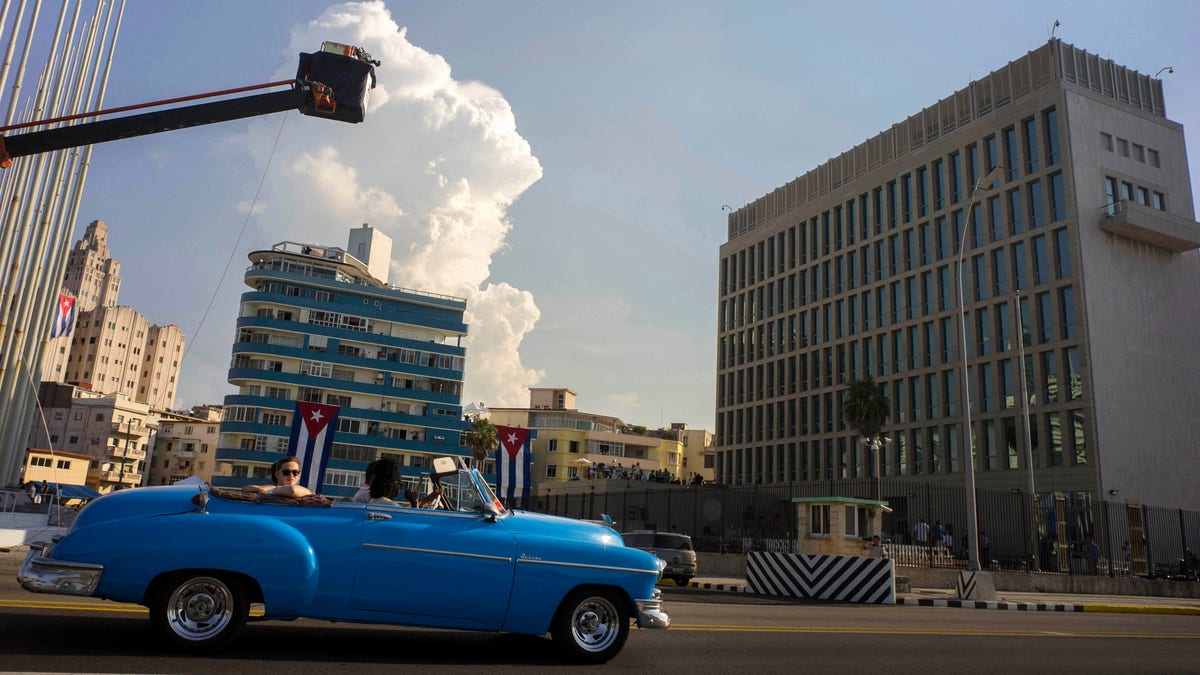
Tourists ride on a vintage American car in front of the U.S. embassy in Havana, Cuba, Thursday, Aug. 13, 2015. The US embassy in Cuba will hold a ceremony on Friday, Aug. 14, to raise the U.S. flag, to mark its reopening on Havanaâs historic waterfront. Ordinary Cubans will cheer, U.S. business executives will network and Secretary of State John Kerry will meet with Cubaâs foreign minister, the countryâs Roman Catholic archbishop and a hand-picked group of dissidents. (AP Photo/Ramon Espinosa)
CORVALLIS, Ore. (AP) – The United States and Cuba resumed diplomatic relations last month after a frosty half century-plus of antagonism, economic embargo and Cold War angst that followed the Fidel Castro-led revolution on the island.
Corvallis residents have been traveling to Cuba -- in an intentional violation of the embargo -- as part of medical aid efforts since the mid-1990s. This year's trip was a bit different, but participants in this year's Pastors for Peace caravan said the thaw in relations still has a ways to go.
"There definitely have been improvements," said Mike Beilstein, Corvallis city councilor for Ward 5 who was making his 10th caravan to Cuba, "but the basic nature of the relationship still is heated. The U.S. still wants the Cuban government to fail, and they still are sabotaging the Cuban economy. Travel has eased and trade is one way (mainly U.S. sales of agricultural products)."
"There was a lot more interest (in this year's caravan) because of the change in U.S.-Cuban relations," said Beilstein, a retired Oregon State University chemist. "But there is a loss of mission as well. `Everything is OK now.' That's why it is important to get out the message that it is not OK."
"There are many things still to work on," said Vesna Stone, who was on her first caravan. Stone, a native of Macedonia, is an anthropologist and state employee who is working on her master's at OSU.
- Five endangered Cuban crocs hatch at Smithsonian’s Zoo
- With reopening of embassies, Cuba and U.S. signal the start of a new post-Cold War era
- Time to rumble! Team USA beats Cuba at wrestling friendly in Times Square
- Cuba like you’ve never seen
- History made in Havana: American flag raised in Cuba for the first time since 1961
The third local member of the caravan was Marge Stevens, a retired OSU accountant, who was making her second trip.
The caravan collected and arranged for the delivery of more than 10 tons of supplies, from wheelchairs to computers to bicycles and adult diapers.
The caravan spent 10 days in country, participating in a series of cultural exchanges that included visits to an adult day care facility, a sewing and clothing cooperative, the graduation ceremony at the Latin American School of Medicine and an international work camp.
"A big part of the reason we go is to attend the graduation," Beilstein said of the medical school, which attracts students from all over the Americas and Africa. Graduates pledge to work on health care back in their own communities, and Pastors for Peace has helped recruit and screen prospective students and raised money to assist with their board exams.
Caravan members pitched in at the work camp visit, including painting and agricultural project duties.
"We were shoveling," said Stevens, who assisted camp members clear out undergrowth among mango trees.
"It was an awesome experience. They really wanted to welcome us," said Stone. "I kept hearing the word `esperanza,' which means hope. I felt loved. And as a first-time person in Cuba I felt extremely safe, day or night. People should know that."
It also was easier in 2015 to for the caravan to get its supplies through U.S. border crossings.
"They used to have this giant X-ray machine that would scan the bus," Beilstein said. "And they would always remove some of the aid. It seemed kind of symbolic, ritualized harassment. If we had 200 computers they would take six . and then return them to us when we came back. This year there was none of that."
